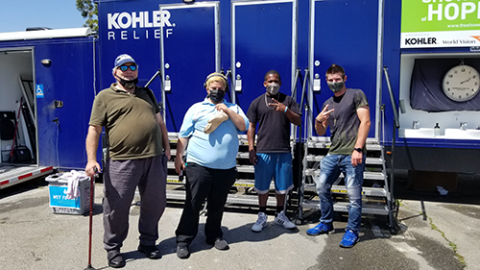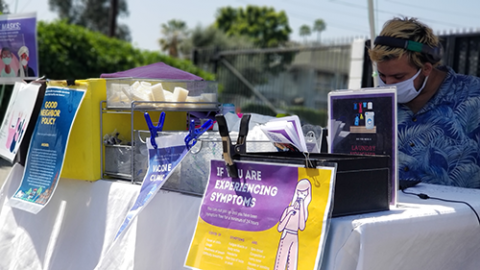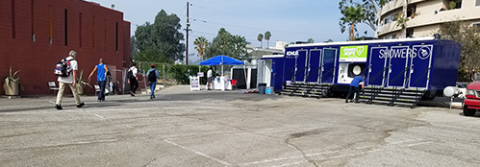
When gyms first closed in March 2020, Compassion Connection, a ministry arm of the Hollywood church that provides shower and personal care resources to unhoused individuals in Los Angeles, suddenly saw a surge in demand for these services.
Before the coronavirus pandemic, three days a week, guests were able to book showers at the Hollywood church. The addition of a mobile shower unit, brought in through a partnership with The Shower of Hope in 2018, had allowed Compassion Connection to provide 300 showers a month on average.
“When the stay-at-home orders went into effect,” said Andrew Froemming, director of administration at Hollywood church and leader of Compassion Connection, “we thought there would be an increase, but we didn’t realize how much.”

The Compassion Connection team, however, was determined to serve amid the crisis. Due to increased demand, Froemming reached out to The Shower of Hope, and together they formed a collaborative partnership with The Kohler Company, Adventist Health, and World Vision to meet the growing needs of their unsheltered neighbors. The partnership currently includes staffing, personal care products, and a specially designed mobile shower unit with seven stalls, allowing Compassion Connection to expand their operations to four days a week and provide 1,000 showers a month. In 2020, they provided more than 7,600 showers.
“Many of our guests are thankful to us for providing a place for them to take a shower, especially during this pandemic,” said Branden Stoltz, pastor of Hollywood church. “I see God orchestrating all of us together into this amazing mechanism to meet the needs of the people in this city. That includes our unsheltered neighbors. God has been very good to us.”

Compassion Connection began providing shower services in 2013. “It all started with a conversation with people in the community,” said Froemming, who started to form relationships with unsheltered people he met on his daily walk to work. Froemming asked what they needed, and he soon discovered that shower access was harder to find than food.
“He saw a need and an opportunity, and he went for it,” Stoltz said. “It’s risky, but that’s what we’re called to do.”
Eight years later, the work continues. Froemming hopes to bring in additional partners, such as medical and laundry services.
“I’m so thankful that I can help people who don’t have access to these services,” Froemming said. “I just think, if I were in this place, I would hope that someone would do the same for me.”

